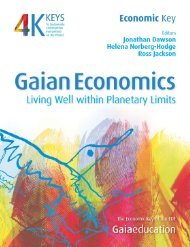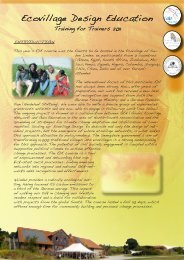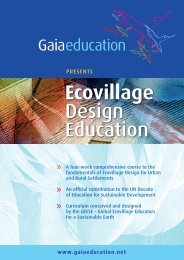Designing Ecological Habitats - Gaia Education
Designing Ecological Habitats - Gaia Education
Designing Ecological Habitats - Gaia Education
Create successful ePaper yourself
Turn your PDF publications into a flip-book with our unique Google optimized e-Paper software.
trees, water anD people : rebuilDing family anD environmental HealtH 207<br />
from pine trees and sawmill remnants. While the wood burns easily it<br />
doesn’t hold a good flame, so Doña Gabriela has to feed her barrel stove<br />
continuously. The smoke released by this resin-heavy pine is black and toxic.<br />
It fills the room and lungs and irritates the eyes of the women working and<br />
the small children tugging at their skirts.<br />
Introduction<br />
Latin America and the Caribbean are tropical climates with exotic animals,<br />
lush rainforests, volcanoes, and fertile lands. However, there is an unromantic<br />
reality to this part of the world that is only now becoming evident. Guatemala,<br />
El Salvador, Honduras, Nicaragua, and Haiti are all facing grave ecological<br />
challenges, afflicting community wellbeing and development. Vital forest<br />
cover and watersheds have been degraded extensively to satisfy growing<br />
demands for firewood and charcoal for cooking, timber for building, and<br />
precious hardwoods for export.<br />
Most rural families living in the five nations in which Trees, Water<br />
& People has been working for the past decade are highly dependent on<br />
forests for income and survival. Natural resources are abundant in the<br />
tropics, but replenishing what is harvested is not a common practice.<br />
There is insufficient government involvement in promoting environmental<br />
awareness, education, and stewardship to help communities take<br />
responsibility and ownership of natural resource management. Instead,<br />
government efforts are generally concentrated in the crowded urban<br />
centers where rural folk have migrated in search of economic gain.<br />
Neglecting the needs and traditions of rural populations has led to the<br />
severe overcrowding of urban centers. Encouraging rural families to revive<br />
their traditional way of life is the first step to rebuilding the communities<br />
and landscapes, as well as curbing urban migration.<br />
Trees, Water & People (TWP) collaborates with local partners to protect<br />
and manage the natural resources upon which a community’s long-term<br />
wellbeing depends. Our international projects revolve around the protection<br />
of forests and watersheds in five Central American nations and Haiti. They<br />
help marginalized communities learn about environmental stewardship to<br />
improve economic livelihoods while protecting natural resources. TWP<br />
introduces eco-friendly technology, such as fuel-efficient cookstoves,<br />
to reduce the demand for wood from native forests. Primary benefits from<br />
TWP reforestation and stove programs include:<br />
1. Improved indoor air quality by removing toxic smoke and<br />
particulates from the kitchen<br />
2. Reduction of time and/or money spent collecting firewood<br />
3. Increase in forest cover through tree planting and lower demand for<br />
wood fuel<br />
4. Climate change mitigation







